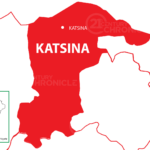Fifth columnists from all walks of life that provide information to bandits regarding security operations are the major challenge facing Katsina State, Governor Dikko Umaru Radda said.
Radda stated this on Wednesday, May 29, 2024 in an interactive session with members of the press as part of the celebrations marking his first year anniversary in office.
While responding to a question on the efforts he was making to expose such bad eggs, the governor brought to light the complex and pervasive issue of banditry, revealing the involvement of various categories of people and the concerted efforts being made to tackle this menace.
The governor emphasised the need for honesty, if only the challenges faced by the state and the country in curbing insecurity could be squarely addressed.
- Minimum wage: Strike begins as National Assembly’s intervention fails
- National anthem change: Is Nigeria losing Its patriotic spirit?”
The unseen faces of banditry
Governor Radda highlighted the extensive involvement of different societal segments in banditry and other criminal activities. “There is no category of people not involved in this,” he stated emphatically, maintaining that arrests have been made across various sectors, including government officials, security personnel, and even traditional rulers.
“It’s not just the poor or the uneducated. Even in prisons, you’ll find people from different walks of life-security agencies, government, and traditional institutions. The bad eggs are everywhere. This revelation underscores a critical issue: the roots of banditry are deep and widespread, implicating individuals who should be safeguarding the community,” he said.
Security breaches and insider information
One of the most alarming aspects of the governor’s address was the issue of insider information compromising security operations. He pointed out that bandits often receive timely tips about impending security actions, suggesting that informants within the system are at play.
He said: “If there is an operation, before you get there, the bandits must have the information. So you must ask yourself, who told them that?”
This breach of trust within the security apparatus is a significant obstacle in the fight against banditry. The governor’s call for transparency and accountability is a stark reminder that without addressing internal corruption and betrayal, efforts to restore peace will be severely hampered.
Responding to the question on his earlier statement that some traditional rulers were put on surveillance, the governor confirmed ongoing surveillance on certain traditional rulers, revealing that some have been arrested for conniving with bandits.
“We were able to arrest a representative of a village head in Kuka village, Bakori local government.
“He was arrested because of his involvement with a bandit. He was given only N700, 000 to allow bandits to come to his village and kill over 30 people,” he said.
These actions highlight the administration’s resolve to tackle the issue head-on, regardless of the individuals involved. The governor’s commitment to exposing and prosecuting collaborators within the community is a critical step towards dismantling the networks that support and sustain banditry.
Governor Radda then stressed the importance of honesty and accountability in addressing the banditry crisis. “We must tell ourselves the truth before we get to the root of the problem,” he urged, calling for a collective acknowledgment of the issues and a united effort to resolve them.
Addressing poverty: The root of banditry
The governor linked the prevalence of banditry to the severe poverty plaguing the region. He pointed out that desperation drives individuals to collaborate with bandits, often for meager sums of money.
“When there is poverty, you even lose your conscience,” he lamented, describing how women and young men are easily recruited by bandits due to their dire financial situations.
To combat this, the government has adopted a dual approach-kinetic and non-kinetic-aimed at reducing poverty and providing job opportunities. The establishment of the Katsina State Enterprise Development Agency, with N3.4 billion allocated for support to small and medium enterprises, is a significant initiative. Additionally, training programmes for youths, such as the recent launch of a mechatronics training scheme for 3,000 youths, aim to equip them with skills and employment opportunities.
Agricultural development and empowerment
Recognising that agriculture is the backbone of Katsina’s economy, the government has taken steps to enhance productivity and provide year-round employment. The creation of the Katsina State Irrigation Authority is intended to facilitate all-year-round farming, reducing the dependency on seasonal agriculture.
Improving agricultural productivity involves not just providing resources but also educating farmers. The governor highlighted efforts to bolster the number of extension workers from 72 to 794, equipping them to offer guidance and support to farmers across the state. This initiative includes distributing 20,000 metric tons of subsidised fertiliser to ensure farmers have the necessary inputs before the planting season begins.
Immediate and long-term relief
Beyond structural initiatives, the government has also provided immediate relief to those most affected by poverty and banditry. According to the governor, over 6,100 farmers have received support, and items worth N2.5 billion have been distributed to women and youths to sustain them. Additionally, food distribution programmes address the urgent need for sustenance among the most vulnerable populations.
The governor’s message is clear; the fight against banditry in Katsina requires a multifaceted approach, addressing both the immediate security concerns and the underlying socio-economic factors. With a combination of transparency, stringent actions against collaborators, and substantial socio-economic initiatives, there is hope for a more secure and prosperous Katsina.

 Join Daily Trust WhatsApp Community For Quick Access To News and Happenings Around You.
Join Daily Trust WhatsApp Community For Quick Access To News and Happenings Around You.

